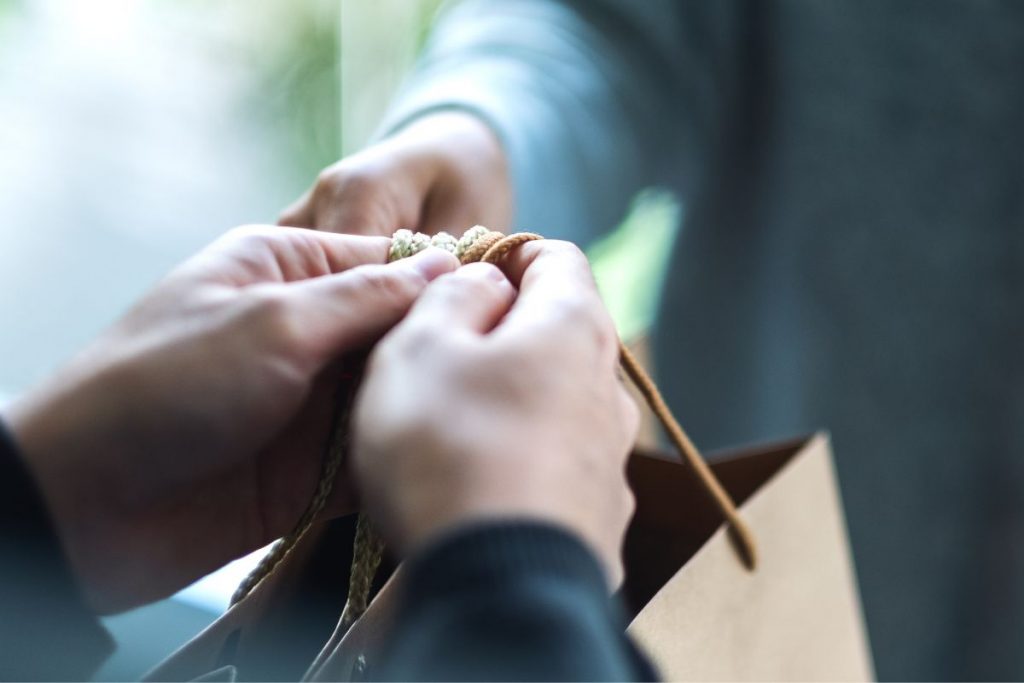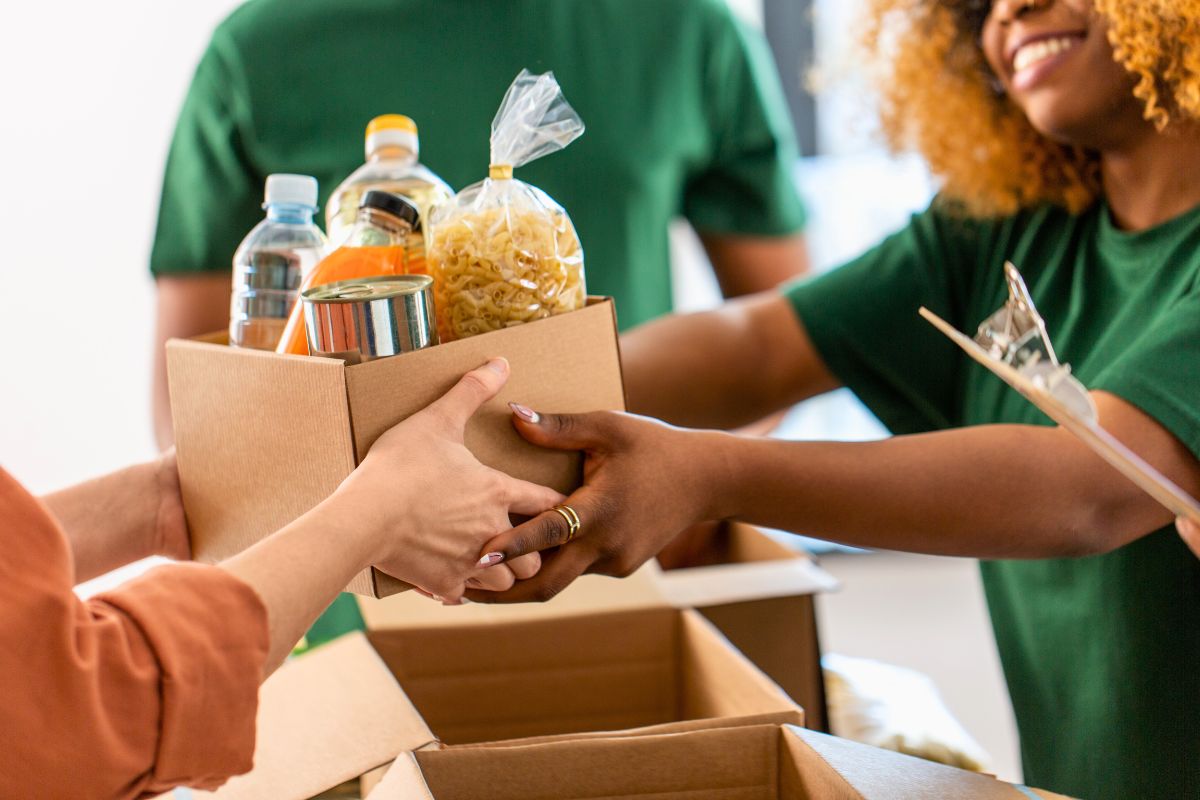A Guide to Making Homeless Blessing Bags

Published February 1, 2024
While blessing bags are always a good idea, we should consider what we put in them more.
According to a formerly homeless mom, most items in the blessing bags are not what the homeless want or need. Most importantly, some items can harm people experiencing homelessness and the community.
We know you just want to help, which will always be appreciated. But you’ll help them more by NOT putting these items inside the blessing bags.
The list below should be considered no more than thought-provoking suggestions. We recommend you assemble your blessing bags according to what you believe is best for the homeless in your community.
Items Not To Include in Homeless Blessing Bags
1. Soap With No Proper Packaging
Soaps are beneficial for homeless people. Of that, there’s no doubt.
But most of the time, people just throw in the soap (and other toiletries) together with the food. As a result, the smell of the soap rubs off on it. This is especially true if the soap comes in thin paper packaging.
If you want to give them soap (and other toiletries, for that matter), be sure to put it in a separate ziplock bag. So when they spill or get wet, it won’t affect the food.
2. Sticky or Hard Foods
When you search the web for what foods to include in blessing bags, granola bars often appear on the list. While they are ideal in some cases, remember that homeless people don’t have ready access to dental services.
As such, they might find it hard to chew sticky and crunchy foods like granola bars and candies. As much as possible, stick to soft foods like tinned soup, crackers, cup noodles, etc.
3. Sugary Foods
Since most homeless people have no access to dental care, sugary foods are also a no-no for them. Not to mention that it poses a health hazard for those with diabetes.
4. Perishable Goods
The idea of a blessing bag is that it will last the receiver for at least a few days. Since most homeless people live on the streets, they don’t have access to a refrigerator. So, if you pack foods for them, stick to non-perishable ones like chips, crackers, jams, etc.
5. Religious Literature
Bibles and bible verses may seem like a thoughtful addition to a homeless blessing bag. And people experiencing homelessness can undoubtedly use an uplifting word or two.
However, you need to remember that we all have different religious beliefs. You might have the best intentions, but it can come off as offensive for some.
If you want to leave them some words of encouragement, choose quotes and sayings with no religious implications. Or you can always talk to them and ask if they would like a bible. It’d be even better if you could spare a few minutes to read a bible verse to them.
6. Sharp or Bladed Objects
For their safety and that of the community, refrain from putting any sharp or bladed weapons in homeless blessing bags. This includes scissors, knives, and steel forks, among others.
7. Matches
For safety and security reasons, avoid putting matches, lighters, and anything that might ignite a fire for security reasons. Aside from being a fire hazard, homeless people probably won’t have much use for it anyway.
8. Broken/ Worn Out Stuff
There’s nothing wrong with donating old clothes and stuff to those in need. But you must make sure that it’s still in good condition. If donating new ones is impossible, ensure they’re not broken or have holes. Don’t give them things that you wouldn’t use or wear. They are already at the lowest point in their lives. Don’t insult them further by giving them stuff that belongs to the trash.
9. Canned Goods with no Pop-Top Openers
Canned goods are ideal for blessing bags. They last long and are very portable. But you need to make sure they have pop-top openers. Not many homeless people carry a can opener with them.
Items To Include in Homeless Blessing Bags
When creating Blessing Bags for the homeless, it’s important to include items that provide comfort and meet basic needs. Here are some of our suggestions:
1. Toiletries
Include travel-sized items like toothpaste, soap, deodorant, shampoo/conditioner, and moisturizer/hand cream.
2. Personal items
Add essentials like pads and tampons, washcloths or face/body wipes, dental floss, and a comb/brush.
3. Non-perishable foods
Include granola bars, energy bars, tuna/cracker packs, trail mix, raisins, peanuts, and fruit cups. You can also consider adding a spoon and gum/hard candy.
4. Hydration
Bottled water is essential to include to help quench thirst.
5. Basic necessities
Pack items like socks, gloves, and face masks for protection.
6. Gift Cards
Ensure you give gift cards to stores within walking distance of them. Walmart or Target gift cards are often the perfect choice.

Things to Consider When Handing Out Blessing Bags
Aside from the contents of your blessing bag, how you hand it out also matters. Here are two ultimate don’ts when handing out blessing bags to the homeless:
Throw Them Out Your Car Window
This might sound rude, but it’s not unheard of. Some people just open their car windows and throw a bag of stuff at a homeless person passing by.
This isn’t the best way to hand out a blessing bag. It’s one of the worst things you can do to a homeless person or to anyone for that matter.
If you’re in a hurry and have no time to park your car, approach the homeless person and gently hand out the blessing bag. You can always donate it to your local charity. They usually have donation drives for the homeless.
Go Alone
This is more of a safety precaution than for any other reason. I’m not saying that homeless people are dangerous. But it’s inevitable to have some bad eggs here and there. And most of the time, it’s hard to distinguish them from those needing help.
To be safe, make sure you’re not going alone. Go with another adult, especially if you have children with you.
Donate To The Poor & Homeless Of South Florida
Our Father’s House Soup Kitchen has fed the poor and homeless in South Florida over 900,000 hot meals since 1993. Our tax deductible non profit organization also accepts and distributes donations such as clothing, toiletries, shoes, bicycles, and more. You can donate to help the poor and homeless through our website.

Reviewed For Factual Accuracy
Our team meticulously fact-checks all website content before publishing. Discover more about our website’s editorial standard here and the dedication we uphold.

About The Author
Judy Ponio is a professional writer and devoted Christian. She has a passion for writing about topics related to morality and helping the poor and homeless. She is the lead author for the Our Father’s House Soup Kitchen blog.
Correct Digital, Inc is paid by private donors to provide website digital marketing services to this non-profit organization.





